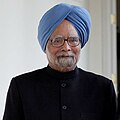| Chief Economic Advisor | |
|---|---|
| मुख्य आर्थिक सलाहकार | |
| Emblem of India | |
| Residence | North Block, Secretariat Building, New Delhi |
| Appointer | Appointments Committee of the Cabinet [2] |
| This article is part of a series on the |
| Politics of India |
|---|
 |
The Chief Economic Adviser to the Government of India (CEA or Chief Economic Advisor of India) advises the government on economic matters and is responsible for the preparation of the Economic survey of India tabled in Parliament before the Union budget of India is presented.
Contents
The CEA holds the rank of a Secretary to the Government of India. The CEA is the ex-officio cadre-controlling authority of the Indian Economic Service. The CEA is head of Economic Division of the Department of Economic Affairs, Ministry of Finance, Government of India. Until 2009, the CEA’s position was a Union Public Service Commission appointment and until the 1970s almost all CEAs were members of the Indian Economic Service.
One CEA, Manmohan Singh went on to become the Prime Minister of India. Four CEAs have gone on to become the Governor of the Reserve Bank of India - I. G. Patel, Manmohan Singh, Bimal Jalan and Raghuram Rajan, and one (Rakesh Mohan) became the Deputy Governor of the RBI.











